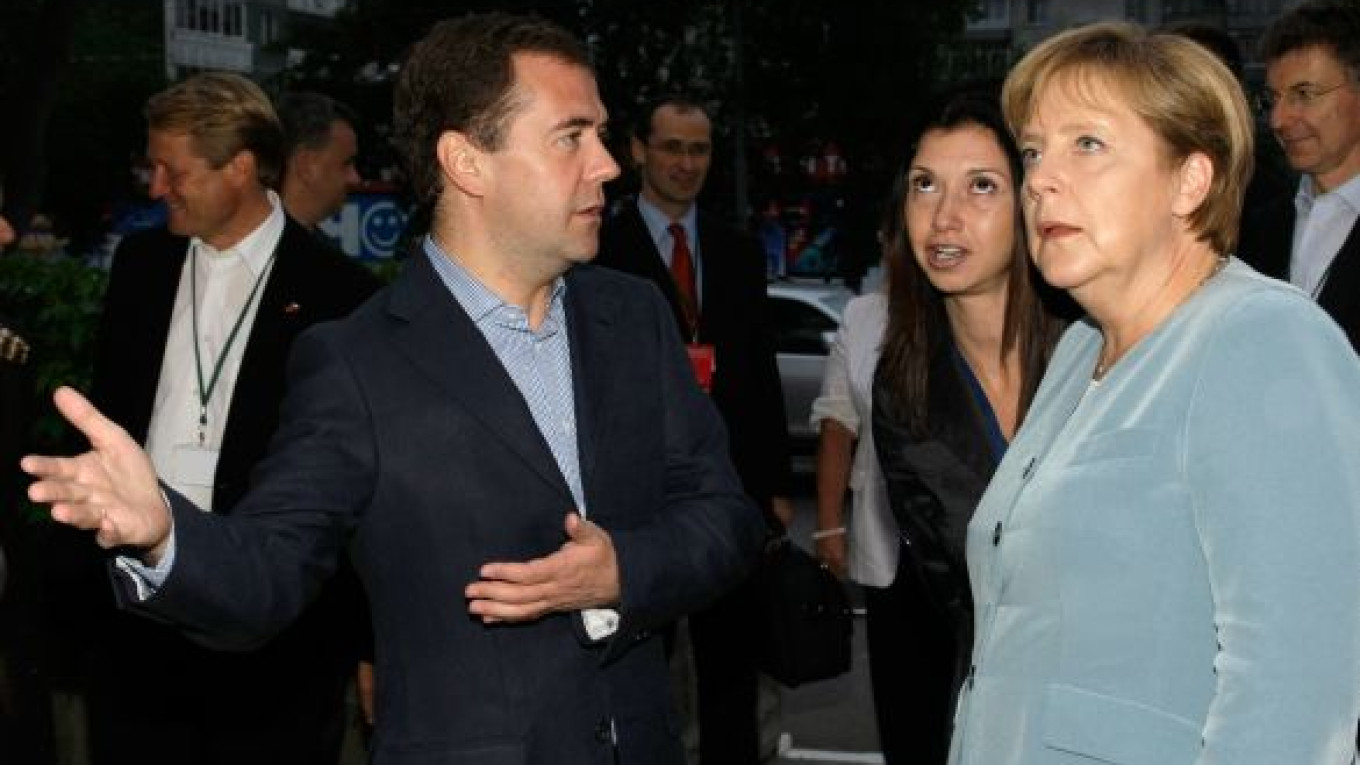President Dmitry Medvedev's agenda of economic modernization will play a prominent role in two days of meetings with German Chancellor Angela Merkel, who arrived in Yekaterinburg on Wednesday evening for the 10th meeting of the St. Petersburg Dialogue.
The forum, created in 2001 to boost bilateral ties, touches on everything from politics to culture, science, media and trade. This year, business leaders will sign at least seven deals on the sidelines of the meeting, forum participants said.
Merkel and Medvedev met for an informal dinner late Wednesday ahead of the forum's main events Thursday. The leaders will meet with the representatives of the Russian-German business community and take part in the intergovernmental consultations.
Germany has "very tight economic relations with Russia," Merkel said late last week.
"Russia is an important energy supplier for Germany, and Germany is an important economic partner for Russia," she said in a video on her web site. "We will be able to intensify German-Russian cooperation even further at the meeting with business representatives."
German technology giant Siemens is expected to sign deals with three state-run companies: Russian Railways, RusHydro and Russian Technologies.
The company plans to sign a memorandum with Russian Railways and Aeroexpress — the commuter train service running to Moscow's three airports — to supply 240 Desiro Rus electric trains over the next decade, a spokeswoman for Siemens said, declining to provide other details.
Siemens will also create a joint venture with RusHydro and Russian Technologies to produce wind turbines as part of the Russian government's policy to increase energy efficiency, she said. The company plans to sign an agreement on joining the Skolkovo innovation hub, as well.
"St. Petersburg Dialogue provides an opportunity for business, and for Siemens' business in particular, to jointly implement various projects aimed at modernization," Sergei Krylov, vice president of Siemens in Russia, said in an e-mailed statement.
He mentioned transportation, energy and health care as possible areas for cooperation.
Another deal likely to come up is interest from Vladimir Yevtushenkov's Sistema holding in acquiring a stake in German semiconductor company Infineon. Medvedev and Prime Minister Vladimir Putin have been dropping hints about the deal to Merkel, Financial Times Deutschland reported last month, without specifying a source.
The economic panels will focus on Medvedev and Putin's modernization program, said Klaus Mangold, the chairman of Germany's Committee on East European Economic Relations.
"The focus is … how to improve Russia's technological base and especially how to improve its competitiveness, because Russia has lost its competitiveness over the last few years during the crisis," he said.
Energy efficiency, in particular, will be a top issue, taking over from natural resources exports, said Michael Harms, chairman of the Russian-German Chamber of Commerce.
The Kremlin had said construction of the Nord Stream pipeline would be among the issues discussed at the forum. Work on the gas pipeline from Russia to Germany began in April after a protracted debate.
"All the obstacles for the pipeline have been removed. … It will be operating next year. So I think in this case everything is rather clear," Harms said by telephone from Yekaterinburg.
Gazprom, which leads the Nord Stream consortium, is also lobbying German electric and gas utility RWE to join its South Stream gas pipeline. RWE said Monday that it would "look into the offer" although the competing Nabucco pipeline would remain its priority, Bloomberg reported.
Analysts also said the forum would be a good chance to prove that trade relations have not stagnated after the economic crisis and last year's failed bid to sell German carmaker Opel to a consortium of Sberbank and Magna International.
Merkel lobbied heavily for the deal, as did Medvedev and Putin, but General Motors eventually scrapped the sale of its European unit.
Alexander Rahr, a Russia expert at the German Council for Foreign Relations, said the forum would seek to dispel the impression of a "pause" in bilateral relations after the Opel deal collapsed.
"It's a good chance for new discussions and maybe a breakthrough," he said.
Russia and Germany had $15.2 billion in trade during the first four months of 2010, a 50 percent increase from a year earlier, the Kremlin said in a statement Tuesday. Their trade volume fell 40.6 percent in 2009, it said.
But the forum — which helped then-President Vladimir Putin and then-Chancellor Gerhard Schroeder develop a close relationship? — is above all a place to improve social dialogue, Harms said, and business will only be part of the agenda.
Medvedev and Merkel will also discuss Iran's nuclear program, Russia's relations with the European Union and European security, as well as control over weapons of mass destruction, the Kremlin statement said.
Medvedev also plans to discuss easing the visa policies between Russia and Germany, Sergei Prikhodko, the president's foreign policy adviser, told reporters Wednesday.
A Message from The Moscow Times:
Dear readers,
We are facing unprecedented challenges. Russia's Prosecutor General's Office has designated The Moscow Times as an "undesirable" organization, criminalizing our work and putting our staff at risk of prosecution. This follows our earlier unjust labeling as a "foreign agent."
These actions are direct attempts to silence independent journalism in Russia. The authorities claim our work "discredits the decisions of the Russian leadership." We see things differently: we strive to provide accurate, unbiased reporting on Russia.
We, the journalists of The Moscow Times, refuse to be silenced. But to continue our work, we need your help.
Your support, no matter how small, makes a world of difference. If you can, please support us monthly starting from just $2. It's quick to set up, and every contribution makes a significant impact.
By supporting The Moscow Times, you're defending open, independent journalism in the face of repression. Thank you for standing with us.
Remind me later.


